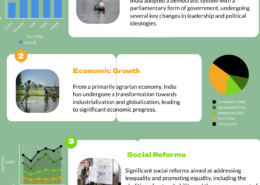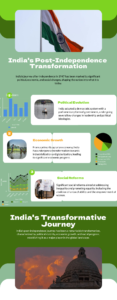Here is an overview of the economy, policies, and politics in recent times: The Economy in Recent Times: Post-Pandemic Recovery: The global economy has been in a recovery phase following the COVID-19 pandemic, which caused significant economic disruptions and contractions in 2020. Inflation ChallengRead more
Here is an overview of the economy, policies, and politics in recent times:
The Economy in Recent Times:
- Post-Pandemic Recovery: The global economy has been in a recovery phase following the COVID-19 pandemic, which caused significant economic disruptions and contractions in 2020.
- Inflation Challenges: Many countries have been grappling with high inflation rates, driven by factors like supply chain issues, the Russia-Ukraine war, and the lingering effects of the pandemic.
- Interest Rate Hikes: Central banks around the world have been raising interest rates in an effort to curb inflation, leading to concerns about the potential for economic slowdowns or recessions.
- Geopolitical Tensions: Geopolitical conflicts, such as the ongoing tensions between Russia and the West, have contributed to economic uncertainty and volatility in global markets.
Key Economic Policies:
- Fiscal Stimulus and Support Measures: Governments have deployed various fiscal policies, including tax cuts, spending programs, and income support, to aid in the economic recovery from the pandemic.
- Monetary Policy Adjustments: Central banks have adjusted their monetary policies, such as raising interest rates and reducing asset purchase programs, to address inflationary pressures.
- Trade Negotiations and Agreements: Countries have been engaged in ongoing trade negotiations and agreements, aiming to strengthen economic ties and overcome trade barriers.
- Climate and Sustainability Policies: There has been an increased focus on policies and initiatives aimed at addressing climate change, promoting renewable energy, and transitioning to more sustainable economic models.
The Role of Politics:
- Political Polarization: Many countries have experienced heightened political polarization, which can hinder the formulation and implementation of cohesive economic policies.
- Elections and Policy Shifts: Changes in political leadership, through elections or leadership transitions, can lead to shifts in economic policies and priorities.
- Geopolitical Tensions and Economic Implications: Ongoing geopolitical conflicts and power dynamics have significant economic implications, as they can disrupt trade, investment, and global supply chains.
- Regulatory and Legislative Changes: Governments have introduced new regulations and legislative measures that can impact various sectors of the economy, such as technology, finance, and energy.



India can encourage greater youth participation and representation in politics and policymaking by implementing the following strategies: Education and Awareness: Incorporate civic education: Integrate civics and political science into school curricula to educate students about the importance of polRead more
India can encourage greater youth participation and representation in politics and policymaking by implementing the following strategies:
Education and Awareness:
Inclusive Political Institutions:
Opportunities for Youth Engagement:
Capacity Building:
Addressing Barriers:
See less